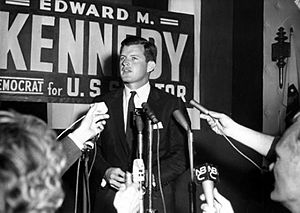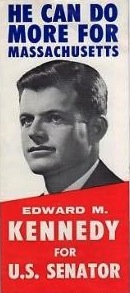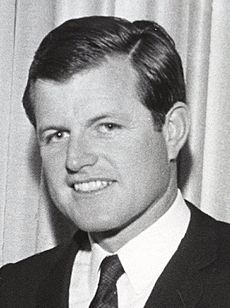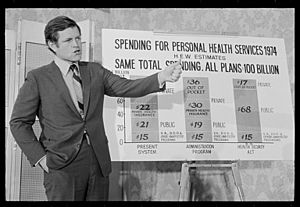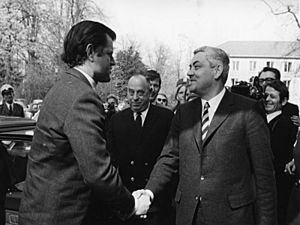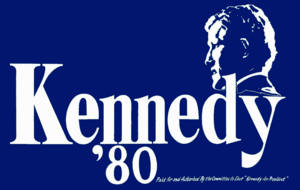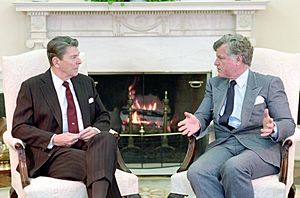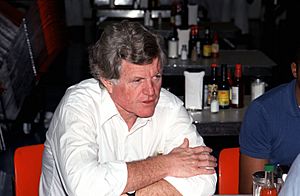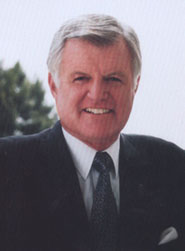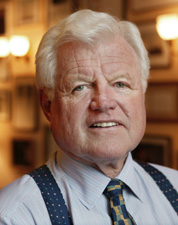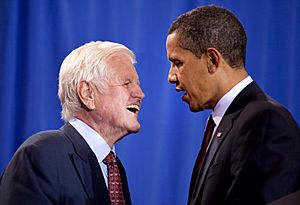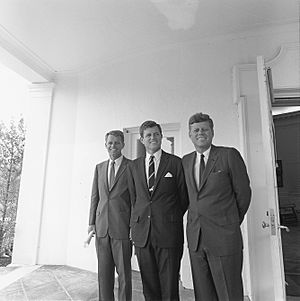Ted Kennedy facts for kids
Quick facts for kids
Ted Kennedy
|
|
|---|---|
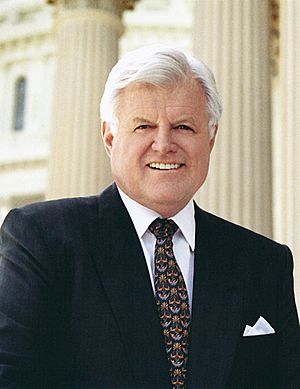
Official portrait, 1990s
|
|
| United States Senator from Massachusetts |
|
| In office November 7, 1962 – August 25, 2009 |
|
| Preceded by | Benjamin A. Smith II |
| Succeeded by | Paul G. Kirk |
| Chair of the Senate Health Committee | |
| In office January 3, 2007 – August 25, 2009 On leave: June 9 – August 25, 2009* |
|
| Preceded by | Mike Enzi |
| Succeeded by | Chris Dodd (acting) |
| In office June 6, 2001 – January 3, 2003 |
|
| Preceded by | Jim Jeffords |
| Succeeded by | Judd Gregg |
| In office January 3, 2001 – January 20, 2001 |
|
| Preceded by | Jim Jeffords |
| Succeeded by | Jim Jeffords |
| In office January 3, 1987 – January 3, 1995 |
|
| Preceded by | Orrin Hatch |
| Succeeded by | Nancy Kassebaum |
| Chair of the Senate Judiciary Committee | |
| In office January 3, 1979 – January 3, 1981 |
|
| Preceded by | James Eastland |
| Succeeded by | Strom Thurmond |
| Senate Majority Whip | |
| In office January 3, 1969 – January 3, 1971 |
|
| Leader | Mike Mansfield |
| Preceded by | Russell B. Long |
| Succeeded by | Robert Byrd |
| Personal details | |
| Born |
Edward Moore Kennedy
February 22, 1932 Boston, Massachusetts, U.S. |
| Died | August 25, 2009 (aged 77) Hyannis Port, Massachusetts, U.S. |
| Resting place | Arlington National Cemetery |
| Political party | Democratic |
| Spouses |
|
| Children |
|
| Parents | |
| Relatives | Kennedy family |
| Education | |
| Signature |  |
| Military service | |
| Branch/service | United States Army |
| Years of service | 1951–1953 |
| Rank | Private First Class |
| Unit | Supreme Headquarters Allied Powers Europe |
| * Dodd served as acting chair during Kennedy's medical leave. | |
Edward Moore Kennedy (February 22, 1932 – August 25, 2009) was an American lawyer and politician. He served as a U.S. Senator for Massachusetts for nearly 47 years. He was a member of the Democratic Party. The Kennedy family is well-known in American politics.
Ted Kennedy was the younger brother of President John F. Kennedy and U.S. Attorney General Robert F. Kennedy. He was also the father of Congressman Patrick J. Kennedy. When he passed away, he was one of the longest-serving senators in U.S. history.
After studying at Harvard University and getting his law degree, Kennedy began his career. He became a senator at age 30 in 1962. He was re-elected seven more times. He was known for his strong speaking skills. People called him "The Lion of the Senate" because of his long service and influence.
Kennedy and his team wrote more than 300 laws that were passed. He was a strong supporter of government helping people. He worked to make society more fair for everyone. He also worked with Republicans to find common ground. He helped pass important laws like the Americans with Disabilities Act of 1990 and the No Child Left Behind Act. He worked for many years to make universal health care available to all Americans.
On August 25, 2009, Kennedy died from a brain tumor at his home. He was 77 years old. He was buried at Arlington National Cemetery near his brothers.
Contents
- Ted Kennedy's Early Life
- College, Military Service, and Law School
- Family and Early Career in Politics
- United States Senator: First Years
- Ted Kennedy in the 1970s
- 1980 Presidential Campaign
- Ted Kennedy in the 1980s
- Ted Kennedy in the Early 1990s
- Ted Kennedy in the Late 1990s
- Ted Kennedy in the 2000s
- Obama and Illness
- Ted Kennedy's Death
- Ted Kennedy's Political Views
- Ted Kennedy's Legacy
- Awards and Honors
- See also
Ted Kennedy's Early Life
Kennedy was born on February 22, 1932, in Boston, Massachusetts. He was the youngest of nine children. His parents were Joseph P. Kennedy Sr. and Rose Kennedy. They were from important Irish American families in Boston. His older siblings included Joseph P. Kennedy Jr., John F. Kennedy, and Robert F. Kennedy.
As a child, Ted moved often with his family. They lived in places like Bronxville, New York, Hyannis Port, Massachusetts, and London, England. He went to many different schools. He was an altar boy and received his First Communion from Pope Pius XII in the Vatican.
Ted faced sadness early in life. His sister Rosemary had a difficult medical procedure. His brothers Joseph Jr. and Kathleen died in accidents. His grandfather, John F. Fitzgerald, who was a former Mayor of Boston, was an early political influence on him. Ted went to Milton Academy for high school. He was a good football player there. He also joined the tennis, drama, debate, and glee clubs.
College, Military Service, and Law School
Ted Kennedy went to Harvard College, like his father and brothers. During his first year, he faced a problem. He and some classmates copied answers during a science exam. He also had a classmate take a Spanish exam for him. Because of this, he was asked to leave Harvard for a time.
In June 1951, Kennedy joined the United States Army. His father helped him get assigned to SHAPE in Paris, France. This meant he did not have to go to the Korean War. While in Europe, he traveled a lot and even climbed the Matterhorn. He left the Army in March 1953 as a private first class.
Kennedy returned to Harvard in 1953. He worked harder on his studies. He played football for the Crimson team. He was a strong player. He graduated from Harvard in 1956 with a degree in history and government.
Because of his earlier grades, Harvard Law School did not accept him. He went to the University of Virginia School of Law instead in 1956. He worked very hard there. He won a major law competition. He also invited many famous speakers to the campus. While in law school, he helped manage his brother John's 1958 Senate re-election campaign. Ted graduated from law school in 1959.
Family and Early Career in Politics
In 1957, Ted met Joan Bennett. They married on November 29, 1958. They had three children: Kara (born 1960), Ted Jr. (born 1961), and Patrick (born 1967).
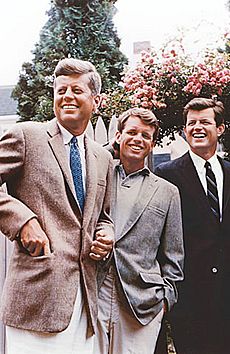
In 1960, his brother John ran for President of the United States. Ted managed his campaign in the Western states. He learned to fly and traveled widely. He met with voters and tried activities like ski jumping and bronc riding. His efforts helped John win important primary elections.
After John became president, he left his Senate seat. Ted was not old enough to take the seat right away. So, a family friend, Ben Smith, held the seat temporarily. This kept the seat open for Ted.
Ted started working as an assistant district attorney in Suffolk County, Massachusetts in 1961. He also traveled overseas to learn about foreign policy. He spoke to local political groups.
In the 1962 Senate election, Ted faced a challenge from Edward J. McCormack Jr.. Some people thought Ted was too young and inexperienced. McCormack said Ted's name was the only reason he was running. But Ted was a good campaigner. He won the primary election by a large margin. In November, he won the special election with 55 percent of the vote.
United States Senator: First Years
Kennedy became a Senator on November 7, 1962. He worked hard on committee tasks and local issues. He was friendly with other senators.
On November 22, 1963, Ted was leading a Senate session. He learned that his brother, President Kennedy, had been shot. His brother Robert soon told him the President had died. Ted and his sister Eunice Kennedy Shriver went to tell their father the sad news.
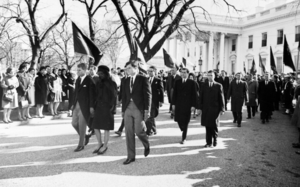
In June 1964, Kennedy was in a small plane crash. The plane crashed in bad weather in Southampton, Massachusetts. The pilot and one of Kennedy's aides died. Kennedy was badly hurt. He spent months in the hospital. This accident caused him back pain for the rest of his life. His time in the hospital made him very interested in health care. His wife, Joan, campaigned for him in the 1964 Senate election. He won by a large margin.
Kennedy returned to the Senate in January 1965. He had a stronger team. He helped pass the Immigration and Nationality Act of 1965. This law changed the way people could immigrate to the U.S. He also helped create the National Teachers Corps.
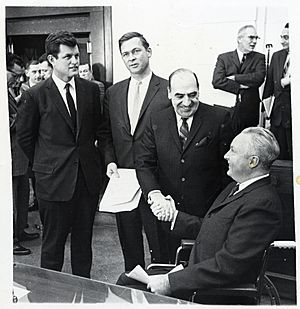
At first, Kennedy supported the U.S. role in the Vietnam War. But after visiting Vietnam in 1968, he became concerned. He suggested the U.S. should tell South Vietnam to improve or the U.S. would leave.
Ted advised his brother Robert not to run for president in 1968. But once Robert decided to run, Ted helped him campaign. Ted was in San Francisco when Robert won the California primary. The next day, Robert was shot and died. Ted was very sad.
After his brothers' deaths, Ted became like a father figure to his 13 nieces and nephews. He was seen as the natural leader of the Kennedy family. In January 1969, Kennedy became Senate Majority Whip. He was the youngest person to hold this position.
Ted Kennedy in the 1970s
Kennedy became a leader in the effort for national health insurance. In 1970, he introduced a bill for universal health care. This would have been paid for by taxes.
Kennedy won re-election easily in November 1970. In January 1971, he lost his position as Senate Majority Whip. He later said this was a good thing. It allowed him to focus more on important issues and committee work. He became chairman of the Subcommittee on Health and Scientific Research.
Kennedy helped pass the Health Maintenance Organization Act of 1973. He also played a key role in creating the National Cancer Act of 1971.
In 1971, Kennedy spoke about the conflict in Northern Ireland. He called for British troops to leave and for a united Ireland. He formed a long friendship with Social Democratic and Labour Party founder John Hume. Kennedy also spoke out against President Richard Nixon's policies in Vietnam. He criticized the U.S. government for ignoring the suffering of refugees in East Bengal. He visited India and Bangladesh to see the situation for himself.
Kennedy decided not to run for president in 1972. He felt he needed more experience. He also wanted to care for his brothers' children.
In 1973, Kennedy's 12-year-old son, Edward Kennedy Jr., was diagnosed with bone cancer. His leg was amputated. This brought a lot of attention to the family. Young Ted's recovery inspired many.
Kennedy worked on campaign finance reform after the Watergate scandal. He helped pass the Federal Election Campaign Act Amendments of 1974. This law set limits on campaign donations. In April 1974, Kennedy visited the Soviet Union. He met with leader Leonid Brezhnev. He also met with Soviet dissidents and helped some leave the country.
Kennedy supported busing to integrate schools. In 1974, a judge ordered busing in Boston. Kennedy went to an anti-busing rally to ask for peace. He was met with anger and had things thrown at him.
Kennedy was considered a strong candidate for president in 1976. But he announced he would not run. He said his decision was "firm, final, and unconditional" for family reasons. He easily won re-election to the Senate in 1976.
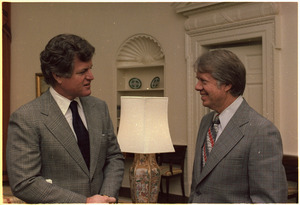
The years with President Jimmy Carter were difficult for Kennedy. They had similar ideas but different priorities. Kennedy became chairman of the Senate Judiciary Committee in 1978.
Kennedy and Carter disagreed on health care reform. Carter wanted to balance the budget first. Kennedy believed health care was a basic right for everyone. In 1979, Kennedy proposed a new universal health insurance bill. Neither his nor Carter's plan passed Congress. This disagreement created a rift between them.
1980 Presidential Campaign
Kennedy decided to run for president in the 1980 election. He challenged the sitting president, Jimmy Carter. Polls showed Kennedy was very popular. He announced his campaign on November 7, 1979.
However, a few days earlier, Kennedy gave a confusing answer in an interview. He was asked why he wanted to be president. This caused some negative news. The Iran hostage crisis and the Soviet war in Afghanistan also helped Carter. People rallied around the president during these crises.
Kennedy's campaign was disorganized at first. He was not an effective speaker early on. In the January 1980 Iowa caucuses, Carter won by a large margin. Kennedy's fundraising dropped. But he kept fighting. He won some later primaries, including New York and Pennsylvania.
Even though Carter had enough delegates, Kennedy continued his campaign. He hoped to change the rules at the 1980 Democratic National Convention. This would have allowed delegates to vote freely. But his effort failed. Kennedy then withdrew from the race.
On August 12, Kennedy gave the most famous speech of his career. He spoke about the "dream of social progress." The audience at Madison Square Garden cheered for a long time. After the convention, Kennedy did not fully support Carter's re-election campaign. This may have contributed to Carter's loss to Ronald Reagan.
Ted Kennedy in the 1980s
In 1980, Republicans won the presidency and control of the Senate. Kennedy was now in the minority party. He reaffirmed his commitment to American liberalism. He became the top Democrat on the Labor and Public Welfare Committee. This was an important decision for his career.
Kennedy became a strong supporter of women's issues. He worked with Republicans to protect the Voting Rights Act of 1965. He also worked to fund AIDS treatment and ensure equal funding for women's sports. He worked long hours. He held public forums to discuss important topics. He was often the main Democrat fighting against President Reagan's policies.
In January 1981, Ted and Joan Kennedy announced their divorce. It was a friendly process. Later that year, Kennedy helped create the Friends of Ireland organization. It supported peace in Northern Ireland.
Kennedy easily won re-election in 1982. He joined the Armed Services Committee. He spoke out against parts of the foreign policy of the Reagan administration. This included U.S. involvement in Central America. He also opposed some new weapons systems. Kennedy was a leading voice for a nuclear freeze. He criticized Reagan's approach to the Soviet Union.
Kennedy considered running for president in 1984. But his family was against it. He also realized he was happy in the Senate. He decided not to run. He campaigned for Democratic candidate Walter Mondale.
Kennedy made a high-profile trip to South Africa in January 1985. He visited Desmond Tutu and Winnie Mandela. He became a leader in pushing for economic sanctions against South Africa. He helped pass the Comprehensive Anti-Apartheid Act of 1986. This law went against President Reagan's wishes.
Despite their political differences, Kennedy and Reagan had a good personal relationship. Kennedy traveled to the Soviet Union in 1986. He helped with arms control talks with Soviet leader Mikhail Gorbachev. He also helped release several Soviet Jewish refuseniks.
Kennedy again considered running for president in 1988. But in December 1985, he announced he would not. He said public service was his life, not the presidency. He helped pass the COBRA Act. This law extended health benefits for people leaving jobs.
After the 1986 elections, Democrats regained control of the Senate. Kennedy became chairman of the Labor and Public Welfare Committee. He was known as a great strategist in the Senate. He worked closely with Republican Senator Orrin Hatch on health issues.
One of Kennedy's biggest fights was against President Reagan's choice for the U.S. Supreme Court, Judge Robert Bork. Kennedy feared Bork would undo civil rights laws. Kennedy gave a strong speech against Bork. This speech made many people angry. But it also gave Kennedy's side time to prepare their case. Bork's nomination was defeated. This battle changed how judicial nominations were handled in Washington.
Kennedy supported Michael Dukakis in the 1988 presidential election. Dukakis lost to George H. W. Bush. But Kennedy won re-election to the Senate easily.
In 1988, Kennedy helped pass an amendment to the Fair Housing Act. This law fights discrimination in housing. He also led the passage of the important Americans with Disabilities Act of 1990. This law protects people with disabilities. Kennedy had a personal interest in this law because of his sister and son. He considered it one of his greatest achievements.
In the late 1980s, Kennedy and Hatch worked to fund efforts against the AIDS epidemic. This led to the Ryan White Care Act. In November 1989, Kennedy visited the Berlin Wall after it fell. He spoke at John-F.-Kennedy-Platz, where his brother John had given a famous speech.
Ted Kennedy in the Early 1990s
Kennedy's personal life became more public. In 1991, he met Victoria Anne Reggie. She was a lawyer and a divorced mother of two. They began dating. She helped bring stability to his life. They married on July 3, 1992. She was credited with helping him have a productive career in the Senate.
Kennedy no longer wanted to be president. He worked well with President Bill Clinton, who took office in 1993. Kennedy helped pass Clinton's National and Community Service Trust Act of 1993. This created the AmeriCorps program.
Kennedy supported Clinton's health care plan. But it failed. This made it harder to pass similar laws for years. In 1994, Kennedy recommended Stephen Breyer for the U.S. Supreme Court. Clinton appointed Breyer. Also in 1994, Kennedy became the first senator with a home page on the World Wide Web.
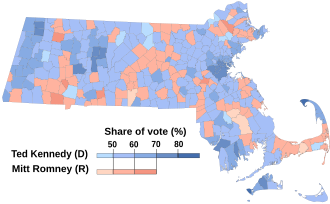
In the 1994 Senate election, Kennedy faced a tough challenge from Mitt Romney. Romney was a successful businessman. Kennedy faced issues from his past. But Kennedy fought back with strong ads. His wife, Vicki, was a great help in campaigning. Kennedy won re-election by a 58 percent to 41 percent margin. This was his closest re-election race.
Kennedy's mother, Rose, died in January 1995 at age 104. After this, Kennedy became more active in his Catholic faith.
Ted Kennedy in the Late 1990s
In 1995, Republicans took control of Congress. Many Democrats felt discouraged. But Kennedy rallied them to fight against Republican plans. By 1996, Democrats were able to move forward with their own laws. Much of this came from Kennedy's team.
In 1996, Kennedy helped increase the minimum wage. This was one of his favorite issues. He also worked with Republican Senator Nancy Kassebaum to pass the Health Insurance Portability and Accountability Act. This law improved how insurance worked and protected medical records. The same year, his Mental Health Parity Act made insurance companies treat mental health the same as other health issues.
In 1997, Kennedy was a main force behind the State Children's Health Insurance Program (SCHIP). This program used tobacco taxes to fund health insurance for children. It was the largest expansion of children's health coverage since the 1960s.
Kennedy strongly supported President Clinton during the 1998 Lewinsky scandal. He helped Clinton's defense team. In 1999, Kennedy voted to clear Clinton of impeachment charges. He said Republicans were using the impeachment power unfairly.
On July 16, 1999, Kennedy's nephew, John F. Kennedy Jr., died in a plane crash. His wife and sister-in-law also died. Ted was now the family leader. He comforted his family at the memorial service. He spoke movingly about his nephew. People saw Ted as the steady, essential leader of the Kennedy family.
Ted Kennedy in the 2000s
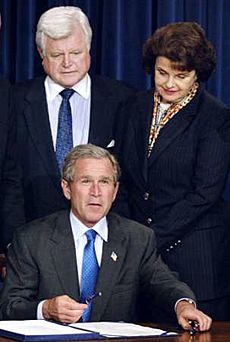
Kennedy easily won re-election to the Senate in 2000. He received 73 percent of the vote. After the close 2000 presidential election, many Democrats did not want to work with President George W. Bush. But Kennedy saw Bush as interested in education reform. They worked together on the No Child Left Behind Act. This law was signed in 2002. Kennedy later became unhappy with the law's funding. He accused Bush of not keeping his word.
Kennedy was in his Senate office during the September 11, 2001, attacks. He called each of the 177 Massachusetts families who lost loved ones. He helped pass laws to provide health care and counseling for the families.
Kennedy supported the U.S. overthrow of the Taliban in Afghanistan. However, he strongly opposed the Iraq War. He was one of 23 senators who voted against the war. As the conflict grew, Kennedy called it "Bush's Vietnam." He also worked to improve safety for soldiers in Iraq.
Kennedy and Bush tried to work together on Medicare prescription drug benefits. Kennedy saw it as a big opportunity. But when the final bill included private plans, Kennedy opposed it. The bill passed in 2003. Kennedy felt betrayed by the Bush administration.
In the 2004 Democratic presidential primaries, Kennedy strongly supported fellow Massachusetts Senator John Kerry. He helped Kerry win the Iowa caucuses. This helped Kerry win the Democratic nomination.
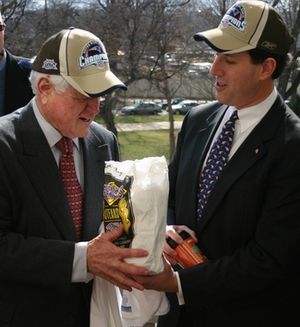
After Bush won re-election in 2004, Kennedy continued to oppose him on many issues. But Kennedy also tried to work with Republicans on immigration reform. In 2005, he teamed with Republican Senator John McCain on the "McCain-Kennedy bill." This bill tried to deal with immigration issues. It did not pass. Kennedy tried again with the Comprehensive Immigration Reform Act of 2007. This bill had strong support from the Bush administration. But it faced strong opposition and failed. Kennedy knew that such big laws often take many tries to pass.
In 2006, Kennedy released a children's book called My Senator and Me: A Dog's-Eye View of Washington, D.C. It was told from the view of his dog, Splash. He also released a political history book called America Back on Track.
Kennedy easily won re-election to the Senate in 2006. He received 69 percent of the vote.
Obama and Illness
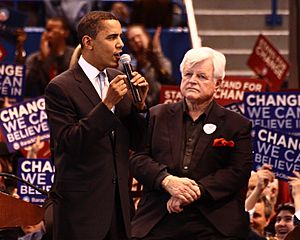
In January 2008, Kennedy endorsed Barack Obama for president. He said it was "time again for a new generation of leadership." He compared Obama's ability to inspire people to that of his brothers. Kennedy's endorsement was very important. It helped Obama gain support across the country. Kennedy also got a promise from Obama to make universal health care a top goal.
On May 17, 2008, Kennedy had a seizure. Doctors found he had a cancerous brain tumor. This sad news brought prayers from many people. On June 2, Kennedy had brain surgery. The operation was successful in its goals. He then began chemotherapy and radiation.
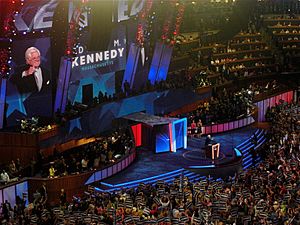
The treatments made Kennedy weaker. But he made a surprise appearance in the Senate on July 9. He voted to help pass a bill. He also insisted on appearing at the 2008 Democratic National Convention on August 25, 2008. He gave a powerful speech. He said, "this November, the torch will be passed again to a new generation of Americans." His speech energized the audience.
On January 20, 2009, Kennedy attended Barack Obama's presidential inauguration. He then had another seizure at a luncheon. He was taken to the hospital but released the next day.
When the 111th Congress began, Kennedy focused all his energy on health care. He saw it as "the cause of my life." He believed this was the best chance for universal health care. He made another surprise appearance in the Senate to help pass Obama's economic stimulus package.
In March 2009, Prime Minister of the United Kingdom Gordon Brown announced that Kennedy would receive an honorary knighthood. This was for his work in the Northern Ireland peace process. A bill expanding the AmeriCorps program was renamed the Edward M. Kennedy Serve America Act in his honor.
By spring 2009, Kennedy's tumor had spread. His treatments were no longer working. He had to retreat to Massachusetts. His friend Chris Dodd took over his role on the Health, Education, Labor and Pensions Committee. Other senators missed Kennedy's presence and his ability to find compromises. In July, a documentary about his life, Teddy: In His Own Words, was shown. At the end of July, Kennedy was awarded the Presidential Medal of Freedom. He could not attend the ceremony. In his final days, Kennedy said, "I've had a wonderful life."
Ted Kennedy's Death
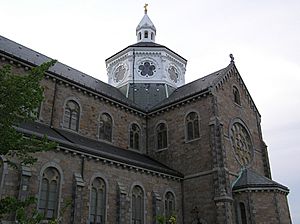
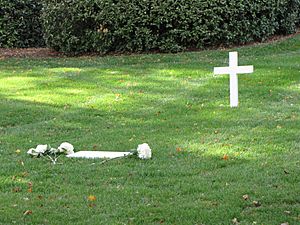
Ted Kennedy passed away on August 25, 2009, at his home in Hyannis Port, Massachusetts. He was 77 years old. His family thanked everyone who supported him.
Reactions to His Passing
President Obama said Kennedy's death was the "passing of an extraordinary leader." Vice President Biden said he "changed the circumstances of tens of millions of Americans." Mitt Romney called Kennedy "the kind of man you could like even if he was your adversary." Former First Lady Nancy Reagan said she was "terribly saddened." Senator Robert Byrd, a close friend, cried when he heard the news.
There were also tributes outside of politics. Flags were lowered at Fenway Park before a Boston Red Sox game. The New York Yankees also held a moment of silence.
Funeral Services and Burial
Kennedy's funeral procession traveled from his home in Hyannis Port to the John F. Kennedy Library in Boston. Over 50,000 people came to pay their respects. On August 29, a funeral Mass was held at the Our Lady of Perpetual Help Basilica in Boston.
President Obama and former presidents Jimmy Carter, Bill Clinton, and George W. Bush attended. Many other political leaders and celebrities were also there. President Obama gave the eulogy.
Kennedy was buried at Arlington National Cemetery. His grave is near those of his brothers, John and Robert.
After His Death
True Compass, Kennedy's memoir, was published three weeks after his death. It became a best-seller.
A special election was held on January 19, 2010, to fill Kennedy's Senate seat. Before his death, Kennedy had asked the state to change a law. This would allow an appointee to fill the seat until the special election. The law was changed. Paul G. Kirk, a former aide, was appointed.
In the special election, Republican Scott Brown won. This was a surprise. It ended Democratic control of the seat that had lasted since 1953. Brown's win meant Democrats lost a key vote for health care reform. However, Democrats still passed the Patient Protection and Affordable Care Act. Kennedy's widow, Vicki, attended the signing. Patrick Kennedy, Ted's son, brought a copy of his father's 1970 health insurance bill as a gift for the president. Patrick then left a note on his father's grave saying, "Dad, the unfinished business is done."
In January 2011, a long period of a Kennedy holding federal office ended. But it resumed in January 2013 when Ted's great-nephew, Joseph P. Kennedy III, became a member of the House. Democrats also regained Kennedy's former Senate seat in 2012.
Ted Kennedy's Political Views
Ted Kennedy was known for his liberal political views. He consistently scored high with groups like the Americans for Democratic Action (ADA). He scored low with conservative groups. He was often seen as one of the most liberal senators.
Kennedy believed in the idea of "never let the perfect be the enemy of the good." This meant he would agree to pass laws that were not perfect. He hoped to improve them later. He was known for working well with Republican senators. This sometimes surprised other Democrats.
Ted Kennedy's Legacy
When Kennedy died, he was one of the longest-serving senators ever. He was called a "Democratic icon" and "The Lion of the Senate." Kennedy and his team wrote about 2,500 bills. More than 300 of these became law. He also helped pass another 550 laws.
Time magazine called him one of "America's 10 Best Senators." They noted his huge record of laws that affected many Americans. Republican Senator John McCain called him a "legendary lawmaker." Arnold Schwarzenegger, a Republican governor and Kennedy relative, called him "a liberal icon, a warrior for the less fortunate."
Kennedy was a strong symbol of American liberalism for many years. He was often mentioned by conservative groups in fundraising. The Associated Press wrote that Kennedy "amassed a titanic record of legislation affecting the lives of virtually every man, woman and child in the country." His death marked the true end of the "Camelot era" associated with his brothers.
Awards and Honors
Senator Kennedy received many awards and honors. These included an honorary knighthood from Queen Elizabeth II of the United Kingdom. He also received the U.S. Presidential Medal of Freedom. He earned honorary degrees from many universities, including Harvard University.
|
See also
 In Spanish: Ted Kennedy para niños
In Spanish: Ted Kennedy para niños


